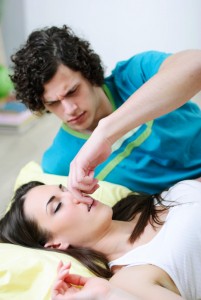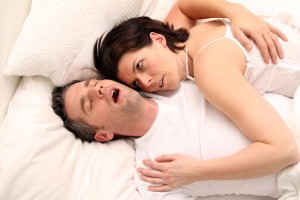 Sleep apnea is the cessation of breathing during sleep for at least 10 seconds at a time. There are two types of sleep apnea: central and obstructive. Central sleep apnea (CSA) is a disorder that causes the brain to stop sending the proper signals to the muscles that control breathing. The most common form of sleep apnea is obstructive sleep apnea (OSA). This form of apnea occurs when airways are blocked during sleep causing the cessation of breathing. Many patients are treated using Continuous Positive Airway Pressure (CPAP) that, as the name suggests, keeps airways open using a continual flow of air. Many CPAP users are unhappy with the system because the sounds it makes are loud, they can’t get used to the sensation of forced air, and because the CPAP system is inconvenient for travel. For patients who suffer from OSA, our Beachwood, OH dental team has an alternative to the CPAP system: oral appliance therapy with The Moses® and SomnoDent®.
Sleep apnea is the cessation of breathing during sleep for at least 10 seconds at a time. There are two types of sleep apnea: central and obstructive. Central sleep apnea (CSA) is a disorder that causes the brain to stop sending the proper signals to the muscles that control breathing. The most common form of sleep apnea is obstructive sleep apnea (OSA). This form of apnea occurs when airways are blocked during sleep causing the cessation of breathing. Many patients are treated using Continuous Positive Airway Pressure (CPAP) that, as the name suggests, keeps airways open using a continual flow of air. Many CPAP users are unhappy with the system because the sounds it makes are loud, they can’t get used to the sensation of forced air, and because the CPAP system is inconvenient for travel. For patients who suffer from OSA, our Beachwood, OH dental team has an alternative to the CPAP system: oral appliance therapy with The Moses® and SomnoDent®.
(more…)
Category: sleep apnea
The Alternative Sleep Apnea Treatment Beachwood Residents Prefer
November 18, 2015
Sleep Apnea Treatment for Patients in the Cleveland Area
June 27, 2011
 If you snore at night or suffer from symptoms like irritability, difficulty concentrating, morning headaches, or daytime drowsiness, you may have sleep apnea.
If you snore at night or suffer from symptoms like irritability, difficulty concentrating, morning headaches, or daytime drowsiness, you may have sleep apnea.
An under-diagnosed condition, sleep apnea can disrupt your (and your partner’s) sleep and have a detrimental effect on your overall health, putting you at risk for a wide spectrum of serious conditions ranging from heart attack to stroke, high blood pressure, heartburn, depression, and even memory loss.
This Daily Mistake Can Make You Obese and Forgetful
August 23, 2010
People who sleep either more or fewer than seven hours a day, including naps, have an increased risk for cardiovascular disease, according to a new study.
Sleeping fewer than five hours a day more than doubles your risk of being diagnosed with angina, coronary heart disease, heart attack or stroke. And sleeping more than seven hours also increases your risk of cardiovascular disease; more than nine hours of sleep results in a 50 percent increase in risk.
The Daily Telegraph reports:
“The most at-risk group was adults under 60 years of age who slept five hours or fewer a night. They increased their risk of developing cardiovascular disease more than threefold … Women who skimped on sleep … were more than two-and-a-half times as likely to develop cardiovascular disease.”
In related news, researchers have also found that sleeping in after a few days of missed sleep can help restore you after missed sleep, nearly erasing any lingering sense of fatigue and mental fuzziness.
How much recovery sleep you need to feel recharged depends on how much sleep you’ve lost.
In the study, volunteers deprived of about three hours of sleep a night for five nights felt nearly, but not quite, back to normal after ten hours of sleep.
To help you get the optimal amount of sleep each night, U.S. News & World Report suggests:
“… [T]ry removing all electronic media devices — BlackBerry, TV, computer — from your bedroom. These distractions … are a prime reason many of us turn out the lights an hour or two later than we originally intended.”
Sources:
It Can Take Your Breath Away-Forever
June 21, 2010
Snoring…Sleep Apnea… High Blood Pressure…Heartburn…Stroke…Heart Attack…Death. There is a statistical corralation between sleep apnea and heart attack. A person has 7 times the normal risk for heart attack if they are overweight, 7.8 times higher with hypertension, 11 times higher with smoking and a 23.3 times higher chance of having a heart attack if you have sleep apnea. Apnea means “without breath”. If you do not breathe for a period of 10 seconds, this is defined as “apnea” or an apneic episode. If you average 5-15 of these episodes in an hour of sleep, you are diagnosed with “mild” sleep apnea. 16-30 episodes per hour is moderate sleep apnea and over 30 episodes is considered severe. The average age of death for a person that has untreated sleep apnea is 55. Think of all the famous people who died in their sleep. You do not have to snore to also have sleep apnea. Taking this simple test can help determine your risk for sleep apnea. If you score higher than 10, then call our office for a consultation. Your life may depend upon it.
Sitting and Reading ______
Watching television ______
For more information, visit https://www.cfad.net/sleep-apnea-treatment.html .
Over-The-Counter Snore Devices Can Lead to Jaw Joint Problems
April 13, 2010
We have a patient who treated himself for snoring. He saw this great ad for a device on the internet. It was fairly inexpensive and easy to use. It was made of soft plastic that you boil and then fit to your own teeth. The device was designed to bring the jaw forward so the tongue would not block the airway and thus stop the snoring. Most people could probably tolerate such a generic appliance, but for some, this may cause a problem, as in the case of our patient. (If you visit our website (https://www.cfad.net/gum-disease-treatment.html), you can learn more about how muscles, teeth, and nerves all work together for maximum function of chewing, breathing, and positioning the jaw. This is called neuromuscular dentistry. )
When the teeth are placed in an abnormal position (as with this night-time OTC snore device), it affects not only the teeth, but the muscles that control the position of the jaw. When this OTC appliance was boiled and fitted by the patient, the lower jaw was not lined up properly with the upper teeth. This torqued the jaw to the right and put stress on the left jaw joint. After wearing this devise for three months in this position at night, the left jaw joint developed clicking, popping and pain. The patient was also unable to bring his back teeth together, which put even more stress on the jaw joints and made chewing difficult. Had the patient not developed jaw pain and sought intervention, his joints might have become permently remodeled to this new position and surgery may have been required. Thankfully we were able to release the muscles with electrical stimulation (TENS) and he was able to get his teeth back together. At the Center For Advanced Dentistry, we are able to treat snoring and sleep apnea with a custom made appliance that is worn at night. This design is created using the principles of neuromuscular dentistry to prevent the onset of problems with TMD pain and other jaw problems. If you snore and want a device designed just for you that is scientifically proven to relieve the problems associated with snoring and sleep apnea, call our office today. Don’t treat yourself when the best professional help is just a phone call away.
If you snore, you may have occult sleep apnea.
March 4, 2010
If you snore, your bed partner may not be the only one who doesn’t have the benefit of restful sleep. You may not be getting enough oxygen to meet your body’s needs. One of the ways to measure the effectiveness of your sleep if you snore is to do an at-home sleep test. The process starts with an evaluation in our office. Dr. Hornstein will check your mouth and airway and all the necessary information will be gathered before the test. This info will be sent to Sleep Optima, the company that provides the equipment and processes the insurance claims. (You can get more information at www.mysleeptest.com.) They will send the equipment right to your house with specific instructions about how to administer the test. The test equipment consists of a headband that contains sensors that collect the needed information. This info is interpreted by the microprocessor in the device. It also has a nasal cannula that you wear in your nose (similar to how oxygen is delivered) that measures airflow and oxygen levels. In addition to respiratory breathing rhythms, the sensors also detect sleep positions, stages of sleep, blood oxygen saturation, pulse rate, and snoring loudness. After using the equipment for two nights, you then return the device back to Sleep Optima. It takes about 7-10 days for the results of the tests to be available.
Sometimes people who snore may not look like they stop breathing, but will have periods of low oxygen levels. This is called occult sleep apnea or hidden times of low O2 levels (also know as hypoxia). Since even occult apnea can lead to an increased risk of high blood pressure, stroke, heart attack and other problems, it is important to rule out sleep apnea in people who snore. If you or a loved one snores, you should consider doing a home sleep test.
It just might save a life!

